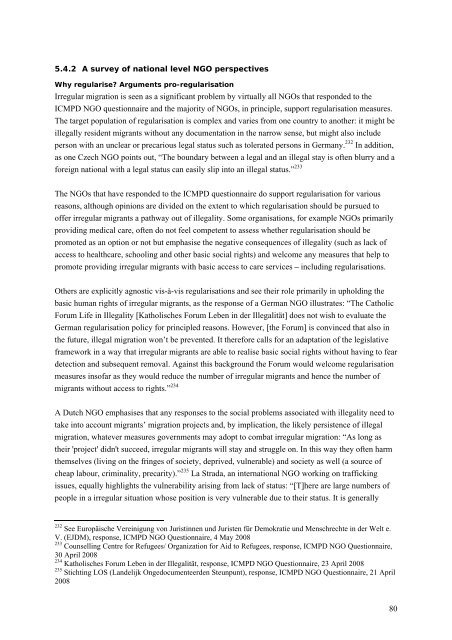REGINE Regularisations in Europe Final Report - European ...
REGINE Regularisations in Europe Final Report - European ...
REGINE Regularisations in Europe Final Report - European ...
Create successful ePaper yourself
Turn your PDF publications into a flip-book with our unique Google optimized e-Paper software.
5.4.2 A survey of national level NGO perspectives<br />
Why regularise? Arguments pro-regularisation<br />
Irregular migration is seen as a significant problem by virtually all NGOs that responded to the<br />
ICMPD NGO questionnaire and the majority of NGOs, <strong>in</strong> pr<strong>in</strong>ciple, support regularisation measures.<br />
The target population of regularisation is complex and varies from one country to another: it might be<br />
illegally resident migrants without any documentation <strong>in</strong> the narrow sense, but might also <strong>in</strong>clude<br />
person with an unclear or precarious legal status such as tolerated persons <strong>in</strong> Germany. 232 In addition,<br />
as one Czech NGO po<strong>in</strong>ts out, “The boundary between a legal and an illegal stay is often blurry and a<br />
foreign national with a legal status can easily slip <strong>in</strong>to an illegal status.” 233<br />
The NGOs that have responded to the ICMPD questionnaire do support regularisation for various<br />
reasons, although op<strong>in</strong>ions are divided on the extent to which regularisation should be pursued to<br />
offer irregular migrants a pathway out of illegality. Some organisations, for example NGOs primarily<br />
provid<strong>in</strong>g medical care, often do not feel competent to assess whether regularisation should be<br />
promoted as an option or not but emphasise the negative consequences of illegality (such as lack of<br />
access to healthcare, school<strong>in</strong>g and other basic social rights) and welcome any measures that help to<br />
promote provid<strong>in</strong>g irregular migrants with basic access to care services – <strong>in</strong>clud<strong>in</strong>g regularisations.<br />
Others are explicitly agnostic vis-à-vis regularisations and see their role primarily <strong>in</strong> uphold<strong>in</strong>g the<br />
basic human rights of irregular migrants, as the response of a German NGO illustrates: “The Catholic<br />
Forum Life <strong>in</strong> Illegality [Katholisches Forum Leben <strong>in</strong> der Illegalität] does not wish to evaluate the<br />
German regularisation policy for pr<strong>in</strong>cipled reasons. However, [the Forum] is conv<strong>in</strong>ced that also <strong>in</strong><br />
the future, illegal migration won’t be prevented. It therefore calls for an adaptation of the legislative<br />
framework <strong>in</strong> a way that irregular migrants are able to realise basic social rights without hav<strong>in</strong>g to fear<br />
detection and subsequent removal. Aga<strong>in</strong>st this background the Forum would welcome regularisation<br />
measures <strong>in</strong>sofar as they would reduce the number of irregular migrants and hence the number of<br />
migrants without access to rights.” 234<br />
A Dutch NGO emphasises that any responses to the social problems associated with illegality need to<br />
take <strong>in</strong>to account migrants’ migration projects and, by implication, the likely persistence of illegal<br />
migration, whatever measures governments may adopt to combat irregular migration: “As long as<br />
their 'project' didn't succeed, irregular migrants will stay and struggle on. In this way they often harm<br />
themselves (liv<strong>in</strong>g on the fr<strong>in</strong>ges of society, deprived, vulnerable) and society as well (a source of<br />
cheap labour, crim<strong>in</strong>ality, precarity).” 235 La Strada, an <strong>in</strong>ternational NGO work<strong>in</strong>g on traffick<strong>in</strong>g<br />
issues, equally highlights the vulnerability aris<strong>in</strong>g from lack of status: “[T]here are large numbers of<br />
people <strong>in</strong> a irregular situation whose position is very vulnerable due to their status. It is generally<br />
232 See Europäische Vere<strong>in</strong>igung von Jurist<strong>in</strong>nen und Juristen für Demokratie und Menschrechte <strong>in</strong> der Welt e.<br />
V. (EJDM), response, ICMPD NGO Questionnaire, 4 May 2008<br />
233 Counsell<strong>in</strong>g Centre for Refugees/ Organization for Aid to Refugees, response, ICMPD NGO Questionnaire,<br />
30 April 2008<br />
234 Katholisches Forum Leben <strong>in</strong> der Illegalität, response, ICMPD NGO Questionnaire, 23 April 2008<br />
235 Sticht<strong>in</strong>g LOS (Landelijk Ongedocumenteerden Steunpunt), response, ICMPD NGO Questionnaire, 21 April<br />
2008<br />
80
















